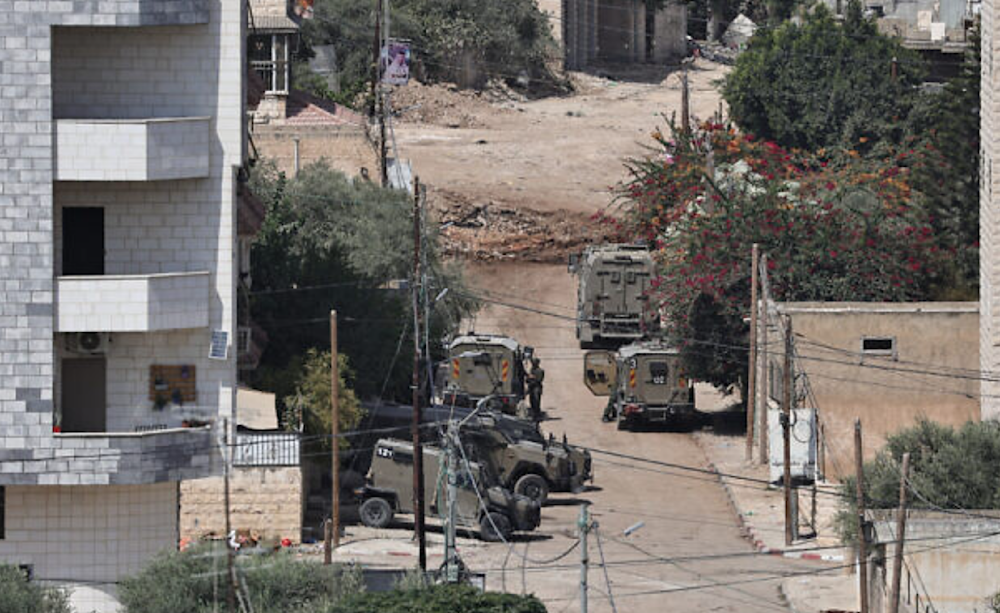'We did not start this': West Bank seeks normalcy after IOF aggression
According to the Palestinian health ministry in Ramallah, 36 persons were murdered during the West Bank operations, including 21 in Jenin.
-

Israeli occupation forces at the center of Jenin in the occupied West Bank, on September 5, 2024 (AFP)
Palestinians in the occupied West Bank are battling to return to normalcy following "Israel's" longest and deadliest aggression on the area in 20 years. On Sunday, traffic clogged the city center for the first time in almost two weeks.
In some places, sewage continued to flow through streets excavated by military bulldozers. Many burnt-out buildings revealed indications of heavy combat, with bullet holes and damaged windows on the higher stories. The water and electrical systems were seriously destroyed, and it is unclear when these services will be restored.
The damage in broad portions of the town was unparalleled, according to Abu Mahmoud, 61, who reported that “even in the second intifada it wasn’t like this, they didn’t destroy the roads and streets and go house to house."
"We did not start this. The Israelis forced this on us," he stated.
Last month, the Israeli regime launched a wide-scale aggression on the occupied West Bank, which killed dozens and destroyed massive amounts of infrastructure.
According to the Palestinian Health Ministry, 36 persons were murdered during the West Bank aggression, including 21 in Jenin. According to the government, the fatalities included eight minors and two elderly individuals. Jenin's mayor, Nidal Abu Saleh, stated the infrastructure damage was estimated at $13 million.
Abu Mahmoud told The Guardian that the new generation of combatants in the camps is only loosely associated with the established Palestinian groups.
“Israel doesn’t distinguish between the factions. In some senses neither do we. We are all Jenin together.”
Khuld Amer, a 39-year-old teacher, and her husband, a public worker, live with their four children in a five-story new building a block from the camp.
Amer reported finding their laptops shattered and their balcony damaged. She reported there must have been female members since “there was blond hair in my hairbrush. It’s a little thing, a drop in the sea compared to what the people in Gaza are going through. But it still shouldn’t be happening.”
18-year-old Qasem al-Hajj stated that “generation after generation, the resistance will endure and get stronger,” expressing what many in the West Bank believe, which is that the worst of Israeli aggression is yet to come.
West Bank Resistance confronts IOF amid expanding military op.
During the early hours of Monday, the IOF were confronted by Palestinian Resistance fighters during the raid of the Balata camp in the city of Nablus, northernmost West Bank.
The Balata Brigades - Youth of Revenge and Liberation and Nablus Brigades - the al-Aqsa Martyrs Brigades reported that its fighters targeted the occupation forces storming the Balata camp and its vicinity with barrages of bullets while fiercely confronting them.
On its part, the al-Quds Brigades - Tulkarm Battalion announced that its fighters confronted the IOF across all combat axes in the Tulkarm camp.
This comes after the IOF stormed the Tulkarm camp and bulldozed some of its roads.
Apocalyptic West Bank war preventable by Gaza ceasefire: Israeli media
Israeli occupation forces are trying to prevent a "full-fledged" Intifada in the occupied West Bank and taking a series of decisions that have displeased illegal settlers. The military is also warning of Israeli ministers' actions, which are bringing the occupied territory closer to an apocalyptic scene.
Among such decisions is the removal of multiple land barriers in the territory, hoping that allowing Palestinians easier movement in the occupied territory would prevent the entire population of the West Bank from joining acts of resistance.
"Therefore, contrary to the demands of the settlers in [in the West Bank], the IDF is removing barriers that were imposed following the car bombings (in al-Khalil) and tries to allow the population as much freedom of movement and livelihood as possible," Ron Ben Yishai, a veteran Israeli war correspondent, wrote for the Ynet news website.
The war correspondent pointed to the pressure employed by Israeli authorities against Palestinians in the West Bank, including bans on work permits, which is encouraging Palestinians to join the Resistance.
Ben Yishai reported that fears are rising of a "mass attack" by Palestinians on illegal Israeli settlements near them.
He also cited the Israeli military command's belief that unless appropriate security measures are taken in the West Bank, the territory "will not ease."

 4 Min Read
4 Min Read








